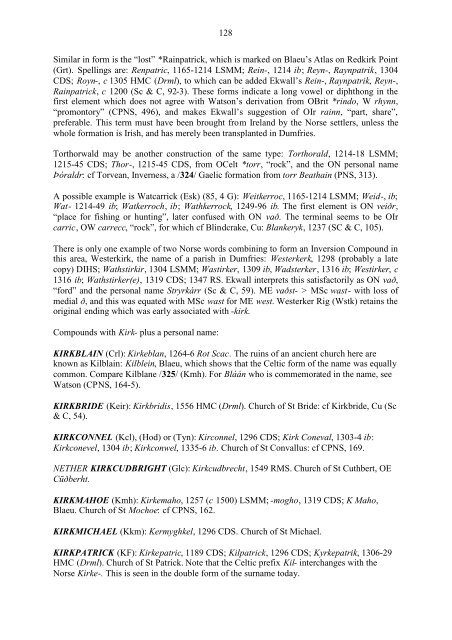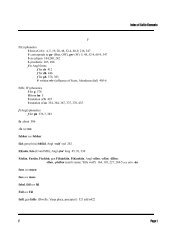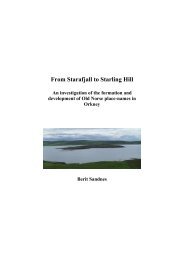May Williamson: The Non-Celtic Place-Names of the Scottish Border ...
May Williamson: The Non-Celtic Place-Names of the Scottish Border ...
May Williamson: The Non-Celtic Place-Names of the Scottish Border ...
You also want an ePaper? Increase the reach of your titles
YUMPU automatically turns print PDFs into web optimized ePapers that Google loves.
128<br />
Similar in form is <strong>the</strong> “lost” *Rainpatrick, which is marked on Blaeu’s Atlas on Redkirk Point<br />
(Grt). Spellings are: Renpatric, 1165-1214 LSMM; Rein-, 1214 ib; Reyn-, Raynpatrik, 1304<br />
CDS; Royn-, c 1305 HMC (Drml), to which can be added Ekwall’s Rein-, Raynpatrik, Reyn-,<br />
Rainpatrick, c 1200 (Sc & C, 92-3). <strong>The</strong>se forms indicate a long vowel or diphthong in <strong>the</strong><br />
first element which does not agree with Watson’s derivation from OBrit *rindo, W rhynn,<br />
“promontory” (CPNS, 496), and makes Ekwall’s suggestion <strong>of</strong> OIr rainn, “part, share”,<br />
preferable. This term must have been brought from Ireland by <strong>the</strong> Norse settlers, unless <strong>the</strong><br />
whole formation is Irish, and has merely been transplanted in Dumfries.<br />
Torthorwald may be ano<strong>the</strong>r construction <strong>of</strong> <strong>the</strong> same type: Torthorald, 1214-18 LSMM;<br />
1215-45 CDS; Thor-, 1215-45 CDS, from OCelt *torr, “rock”, and <strong>the</strong> ON personal name<br />
Þóraldr: cf Torvean, Inverness, a /324/ Gaelic formation from torr Beathain (PNS, 313).<br />
A possible example is Watcarrick (Esk) (85, 4 G): Weitkerroc, 1165-1214 LSMM; Weid-, ib;<br />
Wat- 1214-49 ib; Watkerroch, ib; Wathkerrock, 1249-96 ib. <strong>The</strong> first element is ON veiðr,<br />
“place for fishing or hunting”, later confused with ON vað. <strong>The</strong> terminal seems to be OIr<br />
carric, OW carrecc, “rock”, for which cf Blindcrake, Cu: Blankeryk, 1237 (SC & C, 105).<br />
<strong>The</strong>re is only one example <strong>of</strong> two Norse words combining to form an Inversion Compound in<br />
this area, Westerkirk, <strong>the</strong> name <strong>of</strong> a parish in Dumfries: Westerkerk, 1298 (probably a late<br />
copy) DIHS; Wathstirkir, 1304 LSMM; Wastirker, 1309 ib, Wadsterker, 1316 ib; Westirker, c<br />
1316 ib; Wathstirker(e), 1319 CDS; 1347 RS. Ekwall interprets this satisfactorily as ON vað,<br />
“ford” and <strong>the</strong> personal name Stryrkárr (Sc & C, 59). ME vaðst- > MSc wast- with loss <strong>of</strong><br />
medial ð, and this was equated with MSc wast for ME west. Westerker Rig (Wstk) retains <strong>the</strong><br />
original ending which was early associated with -kirk.<br />
Compounds with Kirk- plus a personal name:<br />
KIRKBLAIN (Crl): Kirkeblan, 1264-6 Rot Scac. <strong>The</strong> ruins <strong>of</strong> an ancient church here are<br />
known as Kilblain: Kilblein, Blaeu, which shows that <strong>the</strong> <strong>Celtic</strong> form <strong>of</strong> <strong>the</strong> name was equally<br />
common. Compare Kilblane /325/ (Kmh). For Bláán who is commemorated in <strong>the</strong> name, see<br />
Watson (CPNS, 164-5).<br />
KIRKBRIDE (Keir): Kirkbridis, 1556 HMC (Drml). Church <strong>of</strong> St Bride: cf Kirkbride, Cu (Sc<br />
& C, 54).<br />
KIRKCONNEL (Kcl), (Hod) or (Tyn): Kirconnel, 1296 CDS; Kirk Coneval, 1303-4 ib:<br />
Kirkconevel, 1304 ib; Kirkconwel, 1335-6 ib. Church <strong>of</strong> St Convallus: cf CPNS, 169.<br />
NETHER KIRKCUDBRIGHT (Glc): Kirkcudbrecht, 1549 RMS. Church <strong>of</strong> St Cuthbert, OE<br />
Cūðberht.<br />
KIRKMAHOE (Kmh): Kirkemaho, 1257 (c 1500) LSMM; -mogho, 1319 CDS; K Maho,<br />
Blaeu. Church <strong>of</strong> St Mochoe: cf CPNS, 162.<br />
KIRKMICHAEL (Kkm): Kermyghkel, 1296 CDS. Church <strong>of</strong> St Michael.<br />
KIRKPATRICK (KF): Kirkepatric, 1189 CDS; Kilpatrick, 1296 CDS; Kyrkepatrik, 1306-29<br />
HMC (Drml). Church <strong>of</strong> St Patrick. Note that <strong>the</strong> <strong>Celtic</strong> prefix Kil- interchanges with <strong>the</strong><br />
Norse Kirke-. This is seen in <strong>the</strong> double form <strong>of</strong> <strong>the</strong> surname today.




